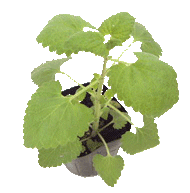The Botany of Catnip
Welcome to my class! My name is Pepper Fries and I have a great class for you about something all cats love. It is catnip! Today mew will learn everything mew wanted to know about catnip, but were afraid to ask.
What is Catnip?
Catnip's scientific name is nepeta cataria. It is native to the Meditteranean area of Europe and has been imported to the American continent where it is considered a weed. It grows wild from the middle of the US north through Canada, but can be cultivated anywhere on the continent that has temperate weather. It is in the mint family Labiatae and has all the typical mint characteristics - perennial, square stems, fragrant, opposite leaves, and small, tight clusters of flowers at the ends of the branches. It may grow up to three feet tall! The leaves are scalloped and heart-shaped, and the flowers are white with purple dots.
The Effects of CatnipWhen us kitties smell catnip, 70-90% of us will exhibit the typical "catnip response" - sniffing, then licking and possibly eating the catnip, then rubbing our chins and cheeks in it, and lastly rolling and squirming in it! The stems and leaves contain certain aromatic oils and a "monoterpene", nepetalactone. It is this nepetalactone that makes us kitties go looney-tunes! It is chemically similar to humans' hallucinogens. Even the big cats, like tigers, exhibit the "catnip response". The catnip response lasts an average of six minutes, and is most intense for about two to three minutes. Once the original response has run its course, it cannot be evoked again for about an hour.
Other Comments on EffectsThe catnip response is inherited as an "autosomal dominant" gene, which means the kitty needs to inherit only one to have the response. It is because of heredity that some kitties ignore catnip (horrors!). Since the response is linked to sexual maturity, kittens and some geriatric cats will not show a response. According to Purdue University, there are no lasting effects of catnip indulgence. Some cats experience short-terms tummy trouble, but that's usually only if they have over-imbibed. So tell your humans that Purdue gives their seal of approval for our recreational drug!
Other Pleasurable Herbs - Mints
Catnip is not necessarily the only plant us kitties like to imbibe. Others are Cat thyme, teucrium marum, which smells good to us but will make our humans think something has died! Kitties will often show a response to catmint, Nepeta mussinii. Guess what? Like catnip, these plants are both in the mint family! So it only follows that a few really sensitive kitties will also love all the mints - peppermint, spearmint, etc. My meowmie had a cat that loved all kinds of mints so much that she would even try to eat mint chewing gum, and she would chew on meowmie's menthol lip balm tube!
Another Pleasurable Herb - ValerianAnother plant that has been identified as evoking a response in kitties is valerian, Valeriana officinalis. The bad news about valerian? Rats like it, too! So tell your humans to beware if they decide to grow valerian! Or, you can just tell them to let you go chase those rats! You can also let them feel better by telling them that your catnip will repel those awful roaches that they hate so much!
I hope you have enjoyed your time in my class, now let's move on to the test!

